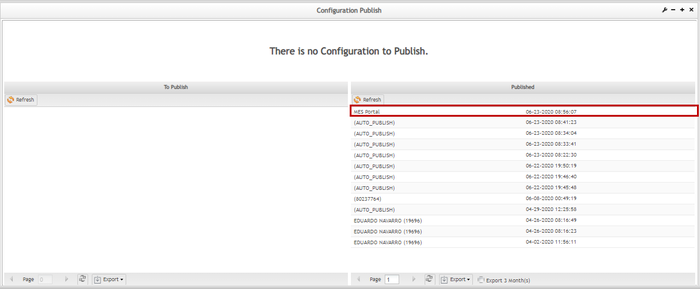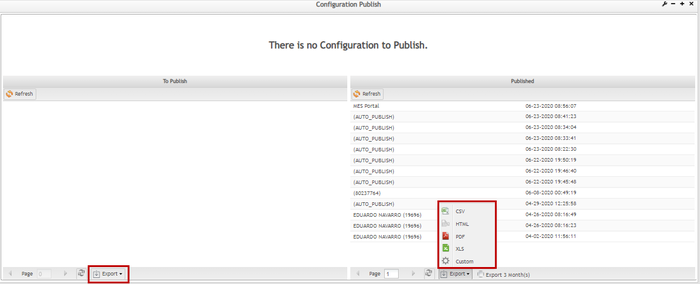Difference between revisions of "42Q-MES0112-C Configuration Publish"
| Line 7: | Line 7: | ||
| | ||
| − | <center>'''Shop Floor Configuration'''</center> <center>'''Configuration'''</center> <center>'''Configuration Publish'''</center> <center>'''Version MES15 | + | <center>'''Shop Floor Configuration'''</center> <center>'''Configuration'''</center> <center>'''Configuration Publish'''</center> <center>'''Version MES15'''</center> <center>'''Revision B1'''</center> <center> </center> |
| | ||
| − | + | <center> </center> | |
| − | + | = <span class="mw-headline" id="Introduction"><span class="mw-headline" id="Introduction"><span class="mw-headline" id="Introduction"><span class="mw-headline" id="Overview">Introduction</span></span></span></span> = | |
| − | |||
| − | - | ||
| − | |||
| − | |||
| − | |||
| − | = <span class="mw-headline" id="Introduction"><span class="mw-headline" id="Introduction"><span class="mw-headline" id="Overview">Introduction</span></span></span> = | ||
42Q’s Configuration Publish portlet is used to publish configuration changes for use with Conduit. For example, when a Part x Route association is configured or a Route is changed, users can publish the configuration for use with Production Scanning. Configuration Publish has the ability to automatically publish these configurations, or users can manually publish them within the portlet. | 42Q’s Configuration Publish portlet is used to publish configuration changes for use with Conduit. For example, when a Part x Route association is configured or a Route is changed, users can publish the configuration for use with Production Scanning. Configuration Publish has the ability to automatically publish these configurations, or users can manually publish them within the portlet. | ||
| − | = <span class="mw-headline" id="Configuration_Publish"><span class="mw-headline" id="Configuration_Publish"><span class="mw-headline" id="Configuration_Publish">Configuration Publish</span></span></span> = | + | = <span class="mw-headline" id="Configuration_Publish"><span class="mw-headline" id="Configuration_Publish"><span class="mw-headline" id="Configuration_Publish"><span class="mw-headline" id="Configuration_Publish">Configuration Publish</span></span></span></span> = |
The Configuration Publish Portlet displays a top panel with two grids underneath: '''To Publish''' and '''Published'''. The top panel displays the amount of pending configuration to publish. If there are pending configurations that need to be manually published, the '''Publish All''' button will display. Selecting this button will publish all pending configurations. Pending configurations appear in the '''To Publish''' list, while changes already published are viewable in the '''Published''' list. | The Configuration Publish Portlet displays a top panel with two grids underneath: '''To Publish''' and '''Published'''. The top panel displays the amount of pending configuration to publish. If there are pending configurations that need to be manually published, the '''Publish All''' button will display. Selecting this button will publish all pending configurations. Pending configurations appear in the '''To Publish''' list, while changes already published are viewable in the '''Published''' list. | ||
| Line 32: | Line 26: | ||
| | ||
| − | == <span class="mw-headline" id="Auto_Publish"><span class="mw-headline" id="Auto_Publish"><span class="mw-headline" id="Auto_Publish">Auto Publish</span></span></span> == | + | == <span class="mw-headline" id="Auto_Publish"><span class="mw-headline" id="Auto_Publish"><span class="mw-headline" id="Auto_Publish"><span class="mw-headline" id="Auto_Publish">Auto Publish</span></span></span></span> == |
Configuration Publish will automatically publish configuration changes when the auto-configuration generic attribute is active. | Configuration Publish will automatically publish configuration changes when the auto-configuration generic attribute is active. | ||
| Line 50: | Line 44: | ||
| | ||
| − | == <span class="mw-headline" id="Manually_Publish"><span class="mw-headline" id="Manually_Publish"><span class="mw-headline" id="Manually_Publish">Manually Publish</span></span></span> == | + | == <span class="mw-headline" id="Manually_Publish"><span class="mw-headline" id="Manually_Publish"><span class="mw-headline" id="Manually_Publish"><span class="mw-headline" id="Manually_Publish">Manually Publish</span></span></span></span> == |
When changes such as a new Part x Route assignment need to be published and Auto Publish is not configured, users can manually publish the configurations. | When changes such as a new Part x Route assignment need to be published and Auto Publish is not configured, users can manually publish the configurations. | ||
| Line 94: | Line 88: | ||
| | ||
| − | === <span class="mw-headline" id="Export"><span class="mw-headline" id="Export"><span class="mw-headline" id="Export">Export</span></span></span> === | + | === <span class="mw-headline" id="Export"><span class="mw-headline" id="Export"><span class="mw-headline" id="Export"><span class="mw-headline" id="Export">Export</span></span></span></span> === |
Both '''To Publish''' and '''Published''' can be exported to several different file types. | Both '''To Publish''' and '''Published''' can be exported to several different file types. | ||
Revision as of 19:43, 5 October 2021
42Q Home > Shop Floor Control > Configuration > Configuration Publish
Introduction
42Q’s Configuration Publish portlet is used to publish configuration changes for use with Conduit. For example, when a Part x Route association is configured or a Route is changed, users can publish the configuration for use with Production Scanning. Configuration Publish has the ability to automatically publish these configurations, or users can manually publish them within the portlet.
Configuration Publish
The Configuration Publish Portlet displays a top panel with two grids underneath: To Publish and Published. The top panel displays the amount of pending configuration to publish. If there are pending configurations that need to be manually published, the Publish All button will display. Selecting this button will publish all pending configurations. Pending configurations appear in the To Publish list, while changes already published are viewable in the Published list.
Figure 1: Configuration Publish Portlet
Auto Publish
Configuration Publish will automatically publish configuration changes when the auto-configuration generic attribute is active.
To use auto-publish,
- Navigate to Administration > Generic Attribute Maintenance.
- Select the Add button.
- Add the generic attribute “auto_configuration_publish” and set it to “yes”. For more information on setting generic attributes, see Generic Attribute Maintenance.
Figure 2: Auto_Configuration_Publish
Once this is done, changes saved in SFDC Configuration will be automatically published.
Manually Publish
When changes such as a new Part x Route assignment need to be published and Auto Publish is not configured, users can manually publish the configurations.
To manually publish configurations,
- Navigate to SFDC Configuration > Configuration Publish.
Pending changes to publish will display in the To Publish grid.
Figure 3: To Publish List
- Select the Publish All button to publish all pending configurations.
Once the publishing process has completed, the published configurations will be removed from the To Publish list and appear in the Published list.
Figure 4: Published List
To view detail about the pending or published configurations,
- Double click the desired configuration from the corresponding list to open the Details pop-up window.
The Details pop-up window displays the following fields
Origin - The area where the configuration was made. Event - Tells whether the change was new (INSERT), an UPDATE, or DELETE. Qty - Quantity
Figure 5: Details pop-up window
Export
Both To Publish and Published can be exported to several different file types.
To Export a grid list, select the Export button for the desired grid, then select the desired file type.
Supported file types:
- CSV
- HTML
- XLS
- Custom
The Custom option is used to export only selected fields.
Figure 6: Export
Due to reducing the retrieving data time to export, the application provides an option to export data for the last 3 months instead of all data since the first day.
Select the option Export 3 Months and select Export to get the report with the last 3 months.
Figure 7: Export 3 Months Option





